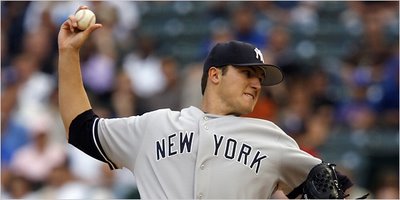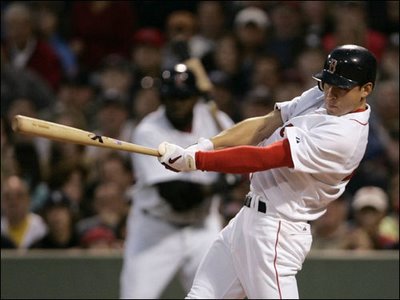January 7, 2008
Hughes or Ellsbury?
Those packages are relatively similar in terms of overall value, so unless other teams get heavily involved the Twins' choice may ultimately come down to picking between Hughes, Ellsbury, or Lester as the deal's centerpiece. Obviously whether Bill Smith and company like Lowrie more than Cabrera or Masterson more than the mid-level prospects from the Yankees will be a big factor, but the decision seemingly hinges on who they think has better odds of becoming a long-term stud.
At first glance Hughes is the easy pick, because he was widely considered the No. 1 pitching prospect in all of baseball heading into last season and may have upped his stock even further since then. In the 2007 version of my annual top-50 prospects list, Hughes ranked second overall behind only Royals third baseman Alex Gordon and I called him "a near-perfect pitching prospect." Ellsbury ranked 33rd on the same top-50 prospects list.
 Since then Hughes posted a 1.91 ERA in 37.2 minor-league innings and had a 13-start stint with the Yankees in which he went 5-3 with a 4.46 ERA, 58-to-29 strikeout-to-walk ratio, and .235 opponent's batting average in 72.2 innings as a 21-year-old. His stuff is overpowering, with a mid-90s fastball that produces tons of ground balls and a fantastic curveball that racks up strikeouts. Despite being very young for each level, Hughes' minor-league track record is amazingly consistent and nearly flawless:
Since then Hughes posted a 1.91 ERA in 37.2 minor-league innings and had a 13-start stint with the Yankees in which he went 5-3 with a 4.46 ERA, 58-to-29 strikeout-to-walk ratio, and .235 opponent's batting average in 72.2 innings as a 21-year-old. His stuff is overpowering, with a mid-90s fastball that produces tons of ground balls and a fantastic curveball that racks up strikeouts. Despite being very young for each level, Hughes' minor-league track record is amazingly consistent and nearly flawless:
LEVEL IP ERA SO9 BB9 HR9 WHIP FIP
Triple-A 28.2 2.20 8.8 2.5 0.0 0.84 1.89
Double-A 123.0 2.20 10.9 2.5 0.4 0.91 2.13
Single-A 118.1 2.05 9.6 1.8 0.1 0.82 1.78
Toss in immediate success as a big leaguer and that's about as good as it gets for a pitcher who won't turn 22 years old until a couple weeks before the 2008 All-Star game. As I wrote two months ago when discussing Hughes' inclusion in various early Santana rumors, short of cloning Francisco Liriano or convincing the Mariners to part with Felix Hernandez, Hughes represents the best chance the Twins have of replacing Santana with an early-20s pitcher capable of being a true No. 1 starter.
That gives him a higher ceiling than Ellsbury, but baseball history is littered with "can't-miss" prospects who indeed "missed" while coming nowhere close to reaching their sky-high ceilings. Projecting the long-term outlook for a 21-year-old pitcher is especially iffy, whereas at 24 years old Ellsbury appears to be more or less fully developed. Ellsbury can't compete with Hughes' upside, but his downside might be more palatable and it's probably safer to assume that he'll at least have a good, long career.
Factor in the Twins' outstanding organization-wide pitching depth and their gaping hole in center field, and it's not difficult to see why they might value Hughes less and Ellsbury more than most other teams. With that said, after all the risk assessment and long-term projecting the bottom line is that the Twins simply need to get at least one player in exchange for Santana who has the potential to be special. There's no doubt that Hughes fits that bill, but saying the same for Ellsbury is less certain.
Ellsbury essentially does everything well except hit for power and looks likely to be a very valuable player for a long time, but the question is whether the Twins should build a trade package for the best pitcher in baseball around someone who may never reach double-digit homers in a season. Ellsbury batted .365 with a .157 Isolated Power during his metal bat-wielding college career at Oregon State and has hit .318 with a .116 Isolated Power in 1,282 plate appearances a pro.
At 24 years old Ellsbury will probably develop some additional pop as he matures, but with 29 homers in 1,300 plate appearances dating back to college it's unlikely that his Isolated Power will rise much beyond .125 or so. For comparison, Luis Castillo's career Isolated Power is .064, so Ellsbury is far from powerless. On the other hand, major-league hitters as a whole posted a .155 Isolated Power in 2007, which would make it tough for him to possess even average power.
 Of course, plenty of hitters with below-average power are still able to be very good players by providing some combination of outstanding defense, speed, and on-base skills. Those are all areas where Ellsbury figures to thrive given that he's an excellent defensive center fielder who's hit .300 everywhere he's gone and has stolen 114 bases at an 81-percent clip in 283 pro games. However, there's some question about exactly how good his on-base skills can be.
Of course, plenty of hitters with below-average power are still able to be very good players by providing some combination of outstanding defense, speed, and on-base skills. Those are all areas where Ellsbury figures to thrive given that he's an excellent defensive center fielder who's hit .300 everywhere he's gone and has stolen 114 bases at an 81-percent clip in 283 pro games. However, there's some question about exactly how good his on-base skills can be.
Ellsbury has drawn a non-intentional walk in 8.8 percent of his pro plate appearances, which puts him solidly above the major-league average of 7.8 percent and works out to around 50-55 walks per 600 plate appearances. If he maintains that walk rate along with a batting average at .300 or so, Ellsbury's on-base percentage would be around .360-.370. That's well above the MLB average of .335, but is it enough to make him a star when it comes along with a .125 Isolated Power?
If things go well for Ellsbury, he looks capable of hitting around .300/.370/.425 on a regular basis. Toss in good defense with 50-steal speed and that's an extremely good player. In fact, it's essentially Kenny Lofton. Like Ellsbury, Lofton is a slight, incredibly fast, lefty-hitting center fielder who was drafted out of a Pac-10 college and made his big-league debut as a 24-year-old. Despite showing even less power than Ellsbury in the minors, Lofton has hit .299/.372/.423 with 622 steals during his 17-year career.
However, while Lofton certainly seems like a good comp for Ellsbury on any number of levels, in reality he's probably more like a good best-case scenario comp. There's no guarantee that Ellsbury can maintain his .300-hitting ways in the majors long term, even his modest minor-league power may not fully translate to the big leagues, and walking in nine percent of his trips to the plate could prove difficult if pitchers aren't afraid to throw him strikes.
At this point Ellsbury looks capable of putting together a Lofton-like career, but with sub par power and non-great plate discipline most of his offensive value is tied to hitting .300. If he instead bats .275 while seeing his Isolated Power drop into the .100 range and walking just seven percent of the time, then Ellsbury goes from Lofton-like to hitting .275/.330/.375. Strong defense and great speed would still make him a solid player, but that's not someone to build a package for Santana around.
Ellsbury fills an immediate need for the Twins and looks like a relatively sure thing to become at least a good player, but his ceiling is seemingly along the lines of Lofton or Johnny Damon. Hughes' ceiling is that of a true ace who could literally replace Santana at the top of the rotation in time, but he'd add to what's already an area of strength for the Twins and there's more risk that he'll flop completely whether because of injuries or performance.
Ellsbury is definitely a worthy long-term building block, but he's also the type of player who the Twins could easily overvalue given their vacancy in center field, tendency to target speed over power, and how well he played during the Red Sox's recent World Series run. Meanwhile, there's less of an opportunity to overvalue Hughes, because he's just about as good as a pitching prospect gets and has a better chance of becoming a truly elite, MVP-caliber player.
A haul for Santana that includes Ellsbury, Lowrie, and Masterson is good one for the Twins and safely beats the Lester/Crisp version of the same package. With that said, if the Twins view the secondary players (Lowrie, Masterson, Cabrera) in the various proposals as being somewhat close to equal, they'd be smart to go after the one player who clearly gives them the best chance to come away from the Santana deal with a superstar. In other words, Phil Hughes.

